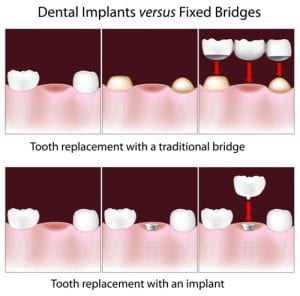
There are many reasons for tooth loss. Tooth loss can affect one’s health, facial features and speech production to name a few. Hence, replacing your lost teeth is important to preserve and/or restore oral function, facial structure and smile aesthetics.
Top common options to replace lost teeth
There are a number of common tooth replacement options: non-implantable (dental bridge, dentures) vs implantable (dental implant)
Dentures (Removable tooth replacement option)
A denture is a removable prosthesis comprising of artificial teeth attached to gum-coloured plastic or metal frame. A partial denture is used to replace one tooth or several teeth, whereas a complete denture is used to replace the teeth in the entire mouth. With a partial denture, metal clasps and other attachments are used to secure the partial dentures to your natural teeth.
Removable dentures don’t require grinding down of adjacent teeth as with a dental bridge or surgical procedure as with a dental implant. They can be removed and reinserted without professional help. However, they are not as stable and generally not as comfortable as the other options. Depending on the fit of the denture, the oral function is not optimal as speech and chewing can be affected; and their aesthetic appearance is also not as natural as with a dental bridge or dental implant, hence affecting one’s smile aesthetics. Dentures are typically a more economical restorative option.
On a practical level, dentures require to be removed and cleaned thoroughly on a daily basis. They also require cleaning after eating as food particles can become trapped. As changes within the mouth occur, such as receding gums and bone loss with age, the denture will need to be replaced to once again restore and optimise one’s oral function, facial appearance and smile aesthetics.
Dental Bridge (Fixed teeth replacement option)
A dental bridge, as the name suggests bridges the gap left behind by a missing tooth or teeth. It consists of artificial replacement tooth or teeth that are permanently attached to the healthy natural teeth on either side of the gap (left by the missing tooth or teeth). Dental bridges are natural looking and blend well with the rest of the teeth. They are also more comfortable and longer lasting than dentures. A dental bridge is a considered a fixed tooth replacement option, as it permanently stays in the mouth and is not required to be removed as per dentures.
In the case of tooth-supported dental bridges, the procedure requires grinding away the adjoining healthy teeth, reshaping them to accommodate permanent capping with dental crowns used to support the bridge, hence damaging them. If the adjoining anchoring teeth become decayed or affected by gum disease, the dental bridge may lose its support and may have to be removed. Also, as there is no tooth stimulating the jawbone, there may be loss of the natural bone underneath the tooth-supported bridge. These changes can alter the facial appearance and smile aesthetics.
Another type of dental bridge is the resin-bonded bridge, also known as Maryland Bridge is a tooth replacement option to restore missing front teeth that are not subjected to the high pressure demands of chewing and biting back teeth are subjected to. The Maryland bridge consists of artificial teeth or tooth, with anchoring wings on each side that attach to the healthy adjacent teeth on either side; hence it usually does not require grinding down of the adjoining healthy teeth.
Dental Implants (Fixed tooth replacement option)
A dental implant is a fixed tooth replacement option, whereby artificial teeth are implanted via a titanium post screwed into the jaw bone. This post acts as the root to which an artificial teeth or tooth is directly and permanently attached to it. Implants can also be used to hold in place a bridge to replace numerous missing teeth.
Dental implants delivers the most natural looking result with natural oral function and are typically more stable than other tooth replacement treatment options. Unlike dental bridges, dental implants do not require the grinding down of healthy teeth. They also provide the functional benefit of stimulating the jaw bone under the replacement tooth or teeth, thus avoiding bone loss and reducing the likelihood of altered smile aesthetics and facial appearance. While dental implants typically have a higher up-front cost, they are generally more stable and last longer than other tooth replacement options.
There are certain health conditions that can pose contraindications to having a dental implant procedure, such as chronic illnesses like diabetes which can delay healing.

The most suitable tooth replacement option will be dependent on the position of the missing tooth and number of teeth you have lost, as well as any relevant health considerations.
At East Ringwood Dental Clinic, our tooth replacement treatments aim to preserve and restore excellent natural oral function, as well as deliver beautiful smile aesthetics.
Please make an appointment on (03) 9870 8243 to discuss the most appropriate tooth replacement treatment option with our highly experienced dentists.
